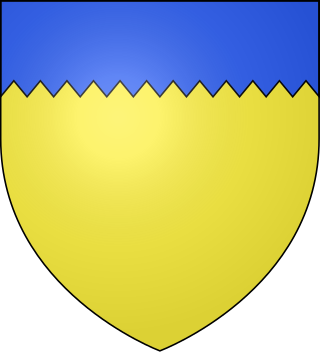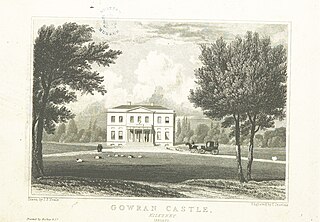
Henry Flood was an Irish statesman and Lord Chief Justice of the King's Bench for Ireland. He was educated at Trinity College Dublin, and afterwards at Christ Church, Oxford, where he became proficient in the classics. He was a leading Irish politician, and a friend of Henry Grattan, the leader of the Irish Patriot Party. He became an object of public interest in 1770, when he was put on trial for murder, after killing a political rival in a duel.

Viscount Clifden, of Gowran in the County of Kilkenny, Ireland, was a title in the Peerage of Ireland. It was created on 12 January 1781 for James Agar, 1st Baron Clifden. He had already been created Baron Clifden, of Gowran in the County of Kilkenny, in 1776, also in the Peerage of Ireland. The Viscounts also held the titles of Baron Mendip in the Peerage of Great Britain from 1802 to 1974 and Baron Dover from 1836 to 1899, when this title became extinct, and Baron Robartes from 1899 to 1974, when this title became extinct, the two latter titles which were in the Peerage of the United Kingdom. The interrelated histories of the peerages follow below.

Gowran is a town located on the eastern side of County Kilkenny, Ireland. The historic St. Mary's Collegiate Church is located in the centre of Gowran close to Gowran Castle. Gowran Park race course and Golf Course are located one km from the centre of Gowran. Gowran is located on the R448 regional road where it is crossed by the R702 regional road.
James Agar, 1st Viscount Clifden, was an Irish peer and politician and held the office of one of the joint Postmasters General of Ireland.
John Butler, Earl of Gowran (1643–1677) was an MP in the Irish Parliament 1661–1666 before being created Earl of Gowran in 1676.

Charles Agar, 1st Earl of Normanton, was an Anglo-Irish clergyman of the Church of Ireland. He served as Dean of Kilmore, as Bishop of Cloyne, as Archbishop of Cashel, and finally as Archbishop of Dublin from 1801 until his death.
Gowran was a constituency represented in the Irish House of Commons until 1800.
William Flower, 1st Baron Castle Durrow PC (Ire) was an Anglo-Irish peer and politician.

Ellis Bermingham (1708-1789) was born in 1708 as Ellis (Elizabeth) Agar, daughter of James Agar MP of Gowran Castle, County Kilkenny and his second wife Mary Wemyss. She married, first (1726), Theobald Bourke, 7th Viscount Mayo, and after his death in 1742 married secondly (1745) Francis Bermingham, 14th Baron Athenry (1692–1750). She had no issue by either marriage.

Butler is the name of a noble family whose members were, for several centuries, prominent in the administration of the Lordship of Ireland and the Kingdom of Ireland. They rose to their highest prominence as Dukes of Ormonde. The family has produced multiple titles such as Baron Cahir, Baron Dunboyne, Viscount Ikerrin, Viscount Galmoye, Viscount Mountgarret, Viscount Thurles, Earl of Carrick, Earl of Kilkenny, Earl of Ormond, Earl of Ossory, Marquess of Ormonde and Duke of Ormonde. Variant spellings of the name include le Boteler and le Botiller. The Butlers were descendants of Anglo-Norman lords who participated in the Norman invasion of Ireland in the 12th century. The surname has its origins in the hereditary office of "Butler (cup-bearer) of Ireland", originating with Theobald Walter, 1st Chief Butler of Ireland. The arms of later family members depicted three cups in recognition of their original office.
Sir Richard Levinge, 1st Baronet was an Irish politician and judge, who played a leading part in Irish public life for more than 30 years.
Henry Welbore Agar-Ellis, 2nd Viscount Clifden SA, styled The Honourable Henry Agar between 1776 and 1789, was an Irish politician.

Warden Flood was an Irish judge who held office as Lord Chief Justice of Ireland, but is mainly remembered now as the natural father of the statesman Henry Flood.

George Agar, 1st Baron Callan PC was an Anglo-Irish politician and peer.

St. Mary’s Collegiate Church Gowran, also known as the Church of the Blessed Virgin of the Assumption, is a church in the centre of the town of Gowran, County Kilkenny, Ireland. The site is a National Monument in the care of the Gowran Development Association (GDA) and the Office of Public Works (OPW). The church and its family connections have been of huge importance to Gowran and further afield over the centuries. The church is a collegiate church, which means that the priests or chaplains attached to it lived in community together. The present church was not a monastery or an abbey; however experts believe the church was built on the site of an earlier monastery. The presence of an Ogham stone on the site, which is on display in the chancel, suggests there was a place of worship here dating back 2000 years to Celtic times or beyond.

Gowran Castle is located in the centre of Gowran, County Kilkenny, Ireland. The castle is a manor house and was fully restored between 2013 and 2014.
Charles Agar was an Irish Anglican priest.

Henry Agar (1707–1746) was an Irish politician, and the father of the 1st Viscount Clifden and the 1st Earl of Normanton.

James Agar was an Irish politician.

Welbore Ellis Agar, 2nd Earl of Normanton was an Irish peer and landowner, of Anglo-Irish origins, who spent most of his life in England, where he acquired the Somerley estate in 1825.









